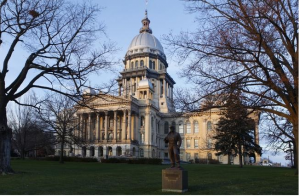2 dead, at least 6 wounded in Chicago shootings
Rauner, leaders meet again, but still no progress
Madigan a no-show at meeting, Rauner’s GOP launches attack website
School funding reform measure passes Senate; fate in House uncertain
How Madigan builds his patronage army
When House Speaker Michael Madigan accidentally triggered a patronage scandal at the Metra commuter rail agency, it was the result of two extraordinary events.
The Chicago Tribune goes after House Speaker Michael Madigan. Here’s a link to the story.
Illinois pension law under financial scrutiny
When Illinois lawmakers narrowly approved major changes to the public employee retirement system last month, supporters touted the measure as saving $160 billion over 30 years.
Here’s the link to a story in the Chicago Tribune.
DCFS under fire about the number of child deaths in state
CHICAGO — Lawmakers questioned Illinois child welfare officials Tuesday about an increase in the number of children reported to have died of neglect or abuse in the state, though agency officials argued the number partly reflected a change in the way neglect cases are counted.
Here’s the link to the story in the Southern Illinoisan.
Ruling points at coal plants’ unsteady future
CHICAGO — The Illinois Pollution Control Board will decide this week whether to give a Houston company extra time to install pollution controls at five Illinois coal-fired power plants that it doesn’t even own yet, a scenario that underscores the uncertainty facing an industry squeezed by environmental regulations and competition from natural gas.
Here’s the link to the story by the Associated Press in the Southern Illinoisan.
Prison overtime pay jumps 34 percent in Illinois
BY JOHN O’CONNOR
THE ASSOCIATED PRESS
According to an AP analysis, Department of Corrections employees made $62 million in overtime pay in the fiscal year that ended in June, more than in any of the past seven years and more than double the $24 million paid out in 2007.
Prisons officials say the amount of overtime has dropped again in the three months since July, but the previous ballooning of costs corresponded with Quinn’s closing of several facilities as a cost-cutting measure.
The state says the costs were driven up by an employee union’s challenge to the closings, but union officials reject that argument, saying they are another symptom of managing an already overburdened system.
The concern “is not so much the overtime as it is the safety and security of the staff here,” said Frank Turner, president of the American Federation of State, County and Municipal Employees union’s branch at the state prison in Pontiac. “With people working overtime, it’s harder to stay focused.”
The state could soon see thousands more prisoners under legislation being pushed by Chicago Mayor Rahm Emanuel and others in the annual fall veto session that resumes the first week of November. The measure, intended to help stem the city’s gang violence, would lengthen prison time for felons and gang members caught with guns. Even first-time offenders would face a mandatory minimum sentence of three years behind bars.
Corrections officials say it could increase the prison population by nearly 4,000 inmates over the next decade, require $260 million for new prisons and cost $700 million extra annually for operations. As of Friday, there were 48,700 inmates in a system designed for less than 32,100, according to Corrections numbers collected and analyzed by the AP.
Corrections spokesman Tom Shaer said overtime increased because AFSCME filed an unsuccessful lawsuit to keep Quinn from closing prison facilities earlier this year, including a penitentiary in Dwight and the state’s super-max prison at Tamms. That, Shaer said, prevented the agency from moving displaced staff members, who had first dibs over newly hired cadets, into vacancies.
In rejecting that argument, the union notes that three classes of new correctional officers were hired during that time and filled positions. The union says it also offered to set aside contract rules that prevented hiring during the lawsuit and proposed other solutions to “give the department added flexibility to reduce the dangers posed and costs incurred by lack of staff in its facilities,” spokesman Anders Lindall said.
Claiming too much overtime jeopardizes safety, Shaer said, is a “shameful scare tactic which ignores the safe and cost-efficient management of our prisons.”
The AP identified the spike in overtime in fiscal 2013 through figures provided by the state after a Freedom of Information Act request.
According to Shaer, overtime has since dropped. He provided figures showing that during the period from July through September, overtime has declined 22 percent compared with the summer of 2012. He said those numbers are the beginning of a trend that could reduce overtime this year by $17 million because there are 9,792 employees in the prisons now, compared to 9,711 before Dwight and Tamms closed.
However, an AP review of past summertime pay periods shows that since 2007, each of the ten lowest pay periods in terms of overtime were in July, August or September. Shaer acknowledged overtime pay is not always requested at the time it’s worked; workers often request payment for past overtime during holiday periods or into the next tax year.
Overtime is voluntary and based on seniority, said Shaer, adding that employees work as much of it as they can to earn more money. The union counters that while it is voluntary, employees often choose to work it rather than go home because they don’t want to leave their colleagues short-staffed.
Prison officials say the prison closures should mean relief for other facilities’ burdened staffs. But the transfer of guards from the shuttered sites did little in the short term to ease the overtime burden in some prisons.
When the Dwight prison closed in April, 128 correctional officers were moved down the road to the state prison at Pontiac. But from April to June, overtime at Pontiac still was up 35 percent. Over the course of the entire year ending in June, overtime at Pontiac more than doubled from $1.1 million the previous year to $2.2 million.
Thirteen positions were open because employees were on leaves of absence, such as for military duty, and overtime is the only way to cover those vacancies, Shaer said, because they must be kept open for returning workers.
Pontiac is key because it received more than 100 inmates from Tamms, a southern Illinois prison that housed the most violent offenders or those who caused trouble in regular populations. They now are in a separate section at Pontiac.
Stateville Correctional Center in Joliet, which includes one of the state’s reception centers for new inmates, paid out $11.1 million in overtime last year, up 46 percent from the previous year.
The new mandatory minimum sentencing bill already has been criticized by prison watchdog groups, such as the John Howard Association, for proposing to lock up more inmates for longer periods without addressing prison crowding. The sponsor, Rep. Mike Zalewski, a Riverside Democrat, met with opponents last week in search of a compromise, but said the state still must act.
“Given that public safety is one of our core issues,” Zalewski said, “we should always choose to protect the safety of our constituents from those who choose to ignore our laws.”


